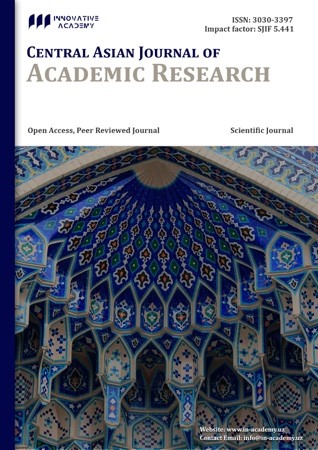THE PHILOSOPHY OF HOSPITALITY IN UZBEKISTAN: TRADITIONAL CULTURE AND INNOVATIVE INSTRUMENTS FOR CREATING UNIQUE GUEST’S EXPERIENCE
Main Article Content
Аннотация:
Hospitality has become an important part of tourism industry that helps to grow the economy of countries. It is a complex sector and it includes different services such as providing guests with accommodation, food and beverages and wonderful experiences. The aim of the study is to explore the role of innovative instruments, hospitality customs and traditional culture on create extraordinary guests’ experience. For collecting data, a mixed-method design was used, for qualitative method we analyzed more than 20 articles, journals and previous studies related to this topic for making a better understanding. The papers were taken from different internet sources, and Web of Science, Research Gate, Google Scholar and etc. For quantitative questions multiple choice questions with open-ended questions used for understanding visitor’s suggestions, issues and their memorable experiences. In this survey both local and international travelers, hospitality staff, and students from foreign countries have participated. According to the results of survey, we can see that, almost 62% of travelers who experienced the hospitality services are satisfied with the facilities provided by hospitality staff. 55.4% of visitors are likely to suggest Uzbekistan as a travel destination that focuses on traditional culture and hospitality.
Article Details
Как цитировать:
Библиографические ссылки:
Abdullayeva, Z. (2023) – Tourist Potential of Uzbekistan and Its Impact on the Hotel Business. Journal of Economy, Tourism and Service.
Abdullayeva Z.I., (2023). The Organizational and Economic Mechanism for the Development of the Hotel Business in Uzbekistan. Journal of Economy and Innovation.
Adongo, C. A., Anuga, S.W., & Dayour, F. (2015). International Tourist’s Experiences of Ghanaian Cuisines. Tourism Management Perspectives, 57-64.
Baek et al., (2019). Determinants of Hotel Guests’ Service Experiences: An Examination of Differences Between Lifestyle and Traditional Hotels. Journal of Hospitality Marketing & Management, 29 (1),1-18
Buhalis D., Leung, R. (2018). Smart hospitality– Interconnectivity and Interoperability Towards an Ecosystem. International Journal of Hospitality Management, 71 (79), 41-50
Cao, Y., Li, X., Dipietro, R., & So, K.K.F. (2019) The Creation of Memorable Dining Experiences. International Journal of Hospitality Management, 308-317
Chittiprolu V. et al., (2021) Heritage Hotels and Customer Experience: a Text Mining Analyses of Online Reviews.
Cohen, E., & Avieli, N. (2004). Food in Tourism: Attraction and Impediment. Annals of Tourism Research, 31(4), 755-778.
Fetscherin & Stephano,2016. The Medical Tourism Index: Scale Development and Validation. Tourism Management, 539-556.
Ganieva, M., Latipova, N., Alekseeva, V., & Abdukhalilov, A., (2019). Uzbek Weddings: Social and Cultural Aspects. International Journal of Recent Technology and Engineering.
Gardiner&Kwek,2016, Chinese Participation in Adventure Tourism: A study of Generation Y International Students Perceptions.
Hjalager, A. M., & Richards, G. (2002) Tourism and gastronomy. Routledge, 2002
Hosany, S., & Witham, M. (2010). Dimensions of Cruisers’ Experiences, Satisfaction, and Intention to Recommend. Journal of Travel Research.
Jimenez Beltran et al., (2016) Gastronomy and Tourism: Profile and Motivation of International Tourism in The City of Cordoba, Spain. Journal of Culinary Science &technology.
Jooa B., Yeong B. Ch., & Chihyung M. O., (2019). Determinants of Hotel Guest’s Service Experiences: An Examination of Differences Between Lifestyle and Traditional hotels. Journal of Hospitality Marketing & Management 29 (1), 88-105, 2020
Karimov, M. (2021). "Traditional Uzbek Hospitality: Values and Practices." Central Asian Journal of Tourism Research.
Khalilova, D. (2020). ‘’Cultural Significance of Boutique Hotels in Uzbekistan’’. Journal of Hospitality and Tourism Studies.
Kim, J.– H., Ritchie, J. R. B., & Mc Cormick, B. (2012). Development of a Scale to Measure Memorable Tourism Experiences. Journal of Travel Research, 51(1) 12-25.
Kim, J.- H, (2014). The Antecedents of Memorable Tourism Experiences: The Development of a Scale to Measure the Destination Attributes Associated with Memorable Experiences, 34-45.
Lashley, C. (2000). Hospitality Management: A New Approach. Oxford: Butterworth-Heinemann

